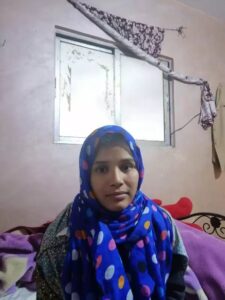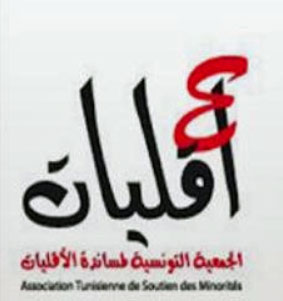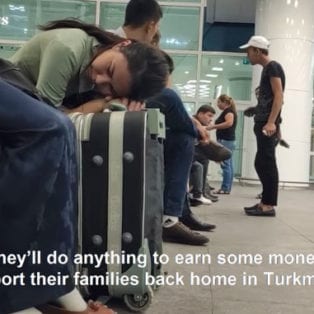Sabina, a domestic worker from Bangladesh, has worked in Jordan for the past eight years, sending money home each month to her mother, sister and 11-year-old son who rely on her to survive. But with the COVID-19 crisis, she has been out of work for more than a month.

Sabina, a migrant worker from Bangladesh in Jordan, had no food to eat after being without work due to COVID-19. Photo courtesy Sabina
“I haven’t eaten for five days,” she said. And neither has her son or family.
At least one-third of the 75,000 migrant domestic in Jordan have lost their incomes and in some cases, their jobs—a scenario repeated around the world as migrant workers, who often work in poverty-level jobs in countries that offer no legal protections or afford them safety nets such as unemployment pay are left stranded during the pandemic.
Some countries like Jordan even make it difficult for migrant workers to receive private contributions, with donations required to be coordinated through the Ministry of Social Development. Organizations such as the Alliance Against Violence and Harassment created a low-profile initiative to distribute packages to migrant workers, especially undocumented migrant workers who are most likely to be without employment now, by coordinating with private donors who provide food and other necessities.
Labor activists around the world report that migrant workers are sharing similar experiences during the coronavirus pandemic. Although they pick our food and clean our houses, migrants and refugees are disproportionately vulnerable to exclusion, stigma and discrimination, particularly when undocumented. More than 200 million migrant workers live and work in other countries, supporting another 800 million family members in their origin countries.
“The coronavirus is blind to borders, citizenship and migration status,” a global coalition comprising dozens of civil society organizations, including the Solidarity Center, say in a statement. “To save lives, public officials must take the lead in respecting non-discrimination and ensuring equal treatment for all, regardless of migration status.” The Solidarity Center also has joined its partners, the Women Migration Network and a coalition led by the Migrant Forum in Asia, in urging governments and employers to uphold the rights of migrant workers.
With the COVID-19 crisis, many are trapped in their destination countries, unable to return home because of closed borders or lack of money to pay for the trip. Often they are trapped by legal restrictions such as the kafala system, which ties workers to a single employer in many Gulf countries. Some are sent to crowded detention camps, where the coronavirus could rapidly spread. Others are forced to live and work in unsafe and unsanitary conditions, picking produce, manufacturing “essential” products, cleaning shops or laboring in construction. They are left out of government support measures, without pay, access to health services or even food.
Unions and their allies are elevating the rights of migrant workers during the COVID-19 crisis, providing direct assistance even as they push for government recognition and support for those without jobs. They are negotiating with employers to provide masks, gloves and other safety gear, and are providing migrant workers with information on taking steps to protect themselves and their families. Below is a snapshot reported by Solidarity Center staff working with unions around the globe.
The Alliance Against Violence & Harassment in Jordan, a Solidarity Center partner, is demanding the government grant migrant workers legal residency during COVID-19, as many permits will expire during lockdown. The Alliance is also urging the government to grant assistance to migrant workers, who have little or no pay but cannot return to their country of origin. The Alliance also asks for safety gear for migrant workers still on the job. The domestic workers solidarity network in Jordan shares information on COVID-19 and its impact on workers in multiple languages on its Facebook page.
The Federation of Trade Unions of Kyrgyzstan, a Solidarity Center partner, converted a hotel it owns into a field hospital for nearly 200 migrant workers who returned from other countries and were ordered into quarantine. Union members provided food and care for the returned workers. Kyrgyzstan migrant workers provide more than one-third of the country’s GDP in money they send home. The Solidarity Center, in coalition with labor and human rights groups, is gathering information on worker rights abuses throughout Central Asia, including migrant worker exploitation.
In Bangladesh, BOMSA, a migrant rights NGO, created COVID awareness-raising leaflets specifically for migrant domestic workers returning to Bangladesh from abroad. Members are distributing soap, disinfectant and other cleaning supplies, and encouraging workers to maintain social distance. Another migrant rights NGO, WARBE-DF, is distributing COVID-19 awareness-raising leaflets to returned migrant workers and their communities; and as thousands of migrant workers return, the organization is engaging in local government coronavirus response committees to ensure inclusion of migrant-specific responses. Both are longtime Solidarity Center partners.
Many migrant workers do not cross borders, but travel from rural villages to cities seeking employment. In Bangladesh’s Konbari area, garment workers who are internal migrants are not eligible for relief aid, which relies on voting lists for distribution. The Solidarity Center-supported Worker Center is connecting with local government officials and has provided nearly 200 names for relief, and is fielding more calls from internal migrant workers seeking assistance.

Across Tunisia, unions and civil society organizations have joined to collect and distribute in-kind donations to assist migrant workers. The Tunisian General Labor Union (UGTT) is among civil society organizations, Parliament members and other public leaders urging the government step up protection of migrants and refugees in Tunisia to ensure their right to health is guaranteed in the same way as all Tunisians. The group also called on the government to examine alternatives to detention of refugees and migrants who are vulnerable to disease and stranded in the El Ouardia and Ben Guerdan centers.
The UGTT defends all citizens and migrant workers, says UGTT spokesperson Sami Al-Tahiri.
“We are all human beings, irrespective of gender, race or religion. Diversity does not negate the unity of humanity across the world.”
In Sri Lanka, where borders closed March 19, the Ministry of Foreign Affairs implemented an online portal, Contact Sri Lanka, so migrant workers could register and be connected with embassies in the countries where they work. Some 17,000 registered last week, more than 6,000 of whom are working in Gulf countries. The Sri Lankan Embassy in Kuwait is making travel documents available online so migrant workers will not need to apply for them in person.
Kuwait has offered an amnesty period through April enabling migrant workers without documents to travel home, and the Kuwait Trade Union Federation is urging the government to quickly address migrant workers basic needs, including facilitating access to health care. The workers are now housed in 12 shelters until travel arrangements are made.
Solidarity Center partner, Turkmen.News, produced a widely distributed video on migration, the coronavirus and state indifference to their plight.

